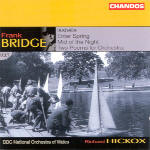Frank Bridge couldn’t write a tacky note to save his life. It’s instructive in this respect to compare this premiere recording of his early tone poem Mid of the Night to Hyperion’s recent release of Granville Bantock’s almost exactly contemporaneous Thalaba the Destroyer. Where Bantock stitches shameless cribs from Tchaikovsky into a ramshackle and repetitive musical structure, Bridge’s thematic material covers large, well-sustained spans and consistently holds the listener’s interest. The lovely central melody introduced by English horn against softly murmuring strings has real lyrical beauty, and Bridge times his climaxes with unerring precision. Isabella, dating from 1907 (three years later than Mid of the Night), features some splendidly passionate string writing and an even more tightly integrated structure.
Two Poems for Orchestra shows Bridge moving confidently toward his mature style, the first movement delicately dissonant and suffused with yearning, the ensuing scherzo bubbling with vitality and a freshness that never turns facile. Enter Spring, a masterpiece of the composer’s full maturity (1927), has the kind of exhilarating, bracingly vital pastoral character encountered more readily in the music of Roussel (middle movement of the Second Symphony) or Milhaud than in the British “cowpat” school, as Constant Lambert contemptuously referred to it. Alas, it’s the weakest performance on the disc. While Richard Hickox’s swift tempos sound wholly convincing, the recording balances the various sections of the orchestra poorly, and climaxes lack clarity. For example, the forte harp figurations at figure 1 fail to penetrate the very light accompaniment, and the percussion (cymbals and bass drum) is completely missing from the big climax at figure 30 (as are the chimes at the end).
Both Britten’s live performance on BBC’s “Britten the Performer” series and Charles Groves’ classic EMI recording reveal far more of Bridge’s luminous orchestral textures and encompass the climaxes with greater transparency. On the other hand, the other three works, more simply scored as they are, come off much better, and a new series devoted to the complete orchestral works of this neglected master is simply too important a prospect for the problems with Enter Spring to preclude an overall recommendation. I do hope, though, that Chandos cleans up its sonic act for future releases. [2/5/2002]
































